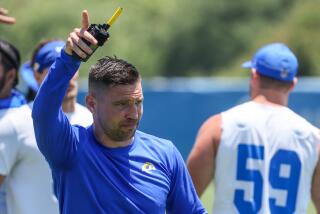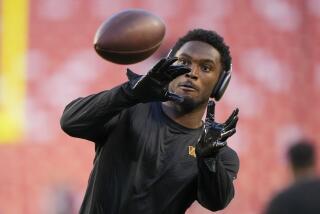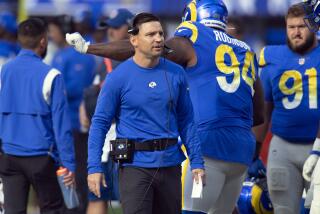Mike Shula: : Alabama’s Quarterback Has Good Breeding and True Grit
- Share via
GAINESVILLE, Fla. — Here he was, crushed in a corner of a claustrophobic hallway outside the visitors’ dressing room, entertaining postgame questions supposedly about himself. Problem is, questions about Mike Shula, quarterback of Alabama and son of Don, often seem to revolve around other people.
Mike and his relationship with his father, the Miami Dolphins’ legendary coach. Mike and his relationship with his older brother, David, the wunderkind assistant to the legendary father. Mike and his pupil-teacher relationship with Bob Griese and Earl Morrall, quarterbacks who played for the legendary father. Mike and the inevitable comparisons with Joe Namath and Ken Stabler and any other Alabama quarterback worthy of mention.
Mike Shula certainly put himself in a tough position by choosing to play quarterback, and at Alabama, for a coach (Ray Perkins) who once upon a time was drafted by his father.
But Shula has handled the situation in a way that counts: He wins. Then he says all the right things about the people and circumstances that have combined to make him all-America caliber at a school contending for a national championship.
When someone in the crush around Shula asks if he minds being compared to his father, Griese, Namath, etc., Shula squirms out of it by noting that winning is what all those people have in common.
“What’s important to me is winning,” Shula said. “So if people want to call me a winner, that’s all right with me.”
Through one full season and parts of two others as a starting quarterback, Shula certainly qualifies as that. Last year, the Crimson Tide rebounded to finish with a 9-2-1 record, complete with two hard-to-believe comebacks for which Shula was to a huge degree responsible. And going into Alabama’s next game--Saturday against Notre Dame--the Crimson Tide has a 4-0 record, for which Shula is largely responsible.
Shula probably won’t seriously contend for the Heisman Trophy. For one thing, Perkins doesn’t want to throw the ball. The Crimson Tide has backs galore, and Perkins, a Bear Bryant disciple, believes in putting them to work.
So, Shula has thrown only 19 passes per game while Alabama has run the ball 48 times a game. Shula’s 61% completion rate is good, but his six interceptions to four touchdowns is not. The Tide won’t remind anyone of Brigham Young.
But Perkins was quick to point out, “His stats do not come close to reflecting what he means to our football team.”
Even so, Shula’s 60.3% completion rate last year set a school record for a single season, as did his 16 touchdown passes (only eight interceptions).
The scouting report on Shula, a 6-foot-2, 200-pound senior, is similar to the reports on his dad and Griese as players: Bright, works hard, leads other players well, graceful under pressure, not especially gifted physically.
Says Perkins: “Mike was not blessed with great ability. He still doesn’t have the great ability and he won’t ever have it. But what Mike does is get more out of the ability he does have than just about anybody I’ve been around.”
For more than two years, it looked as if the only place Shula would be getting anything out of his ability would be the practice field. Perkins said he was disappointed with Shula’s arm strength when he arrived in 1983.
So Shula sat. Don Shula obviously is proud of his son now, but he was prouder two years ago when Shula was on the bench and feeling blue.
“The year before last, when he hung in there, that was the real test,” Don Shula said. “I know he was really down. It probably was the toughest thing he’s ever had to deal with because he’s never been down before.
“He’d been playing well in high school, and all of a sudden, he’s No. 2. He’s not getting any practice time, he’s watching from the sideline. It’s pretty hard to hang tough in that situation.”
It probably didn’t hurt that Alabama was suffering through a 5-6 season. Shula wound up starting six games and led the Tide to three victories in the final four games. He brought Alabama from behind to beat Mississippi State, and Perkins knew he had found a quarterback.
“I brought him in as a substitute and he threw two touchdowns and we win the game,” Perkins remembered. “I saw his confidence just shoot up after that.”
It wouldn’t take long for Shula to make much bigger contributions. Against Georgia, in the 1985 season opener at Athens, he had 50 seconds to go 71 yards with his team trailing. Shula needed only 35 of those ticks to drive the Tide the length for a game-winning 17-yard touchdown pass to Albert Bell.
Against Auburn, in the season finale, Shula had only one minute to play, the Tide trailing by a point, when he passed Alabama into Van Tiffin’s field goal range for victory.
Here a week ago, Shula threw two interceptions, but rallied the team for a 21-7 victory over Florida.
“It’s been frustrating a little,” Shula said. “I don’t want to do things like I’ve been doing in the first half. I want to be smart with the football.”
Shula often says things like that, things that sound like something a coach would say; things that raise the issue of his father.
Don Shula has rarely seen his sons play. He saw David once. He has yet to see Mike in person.
“I have to go somewhere where there’s lots of space to move around,” Don Shula said. I just can’t sit around . . . 76,000 people and that’s your guy out there with all that heat on him. And he seems to enjoy it, thrive on it.
“There’s been too much said about him being Don Shula’s son, and not enough about Mike’s own accomplishments. When you’re up there under center it doesn’t matter whose son you are; you’ve got to think, you’ve got to react, you’ve got to make the play.
“Mike has had some opportunities, certainly, having been around guys like Griese, Morrall, Strock, Marino. But that’s just looking and listening. You still have to do it. You can stand right there and watch Nicklaus hit the ball, but it doesn’t mean you can go out and do it.”
More to Read
Go beyond the scoreboard
Get the latest on L.A.'s teams in the daily Sports Report newsletter.
You may occasionally receive promotional content from the Los Angeles Times.










